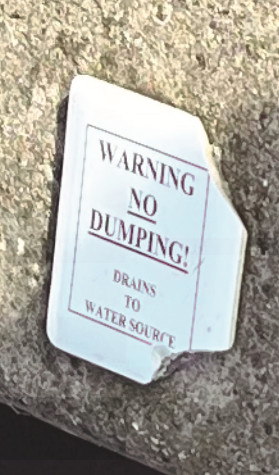A student witnessed an employee from Carpet Tech, a carpet cleaning company contracted by UTD Housing, dumping used cleaning water down a UV Phase 1 storm drain.
Carpet Tech was hired by UTD Housing to maintain the UV apartments. According to their website, the water they use to clean carpets is cleaner than tap water, resulting in effective stain removal. The water collected contains dust, dirt and other contaminants from the carpet. Zachary Tidwell, a supply chain management junior and UV resident, observed dirty water being dumped from a Carpet Tech truck into a storm drain on Jan. 19, 2023. Tidwell shared a video of the dumping that same day. The storm drain had a sign that said “Warning, no dumping. Drains to water source.” Tidwell said the dumping had a pungent order and left behind a dirt stain on the cement in front of the storm drain.
“I don’t know if there’s any follow up or not because Carpet Tech is still here and it’s not just one employee doing it, it’s multiple,” Tidwell said. “It was a white dude one day, it was a Black dude another day. I mean it’s not just one person practicing these things, it’s multiple.”
Tidwell said that he was frustrated with the incident, as it could have detrimental impacts on the surrounding natural environment, ground water distribution and cleanliness of the UV area. According to the city of Frisco, water that enters storm drains is directly channeled into freshwater sources without any treatment or filtration. As a result, much of this water finds its way to larger lakes and rivers, which are primary water supply sources for many Texas cities.
Chemicals such as fertilizer, pesticides, pet waste, sediment and trash can easily accumulate and wash into storm drains when it rains. However, directly dumping water that could contain contaminants is known as illegal or illicit dumping. Round Rock, Texas defines anything other than water that comes from the sky as illegal dumping, with some exceptions being made for water from car washes and fire protection. According to Round Rock, one of the most common sources of illegal dumping is from household cleaners.
Joan Wickersheim, director of institutional risk and safety, said that accidental spillage in storm drains is not uncommon. Every year, the city of Richardson releases a municipal separate storm sewer system (MS4) report, which includes the frequency of illicit dumping in the area. The city’s most recent report said that in 2021, Richardson received 40 reports of hazardous spills from third party contractors.
Matthew Grief, associate vice president for student affairs, said in an email statement that when UTD housing was made aware of the situation, their staff contacted Carpet Tech and directed them to the appropriate location to dump dirty water. Carpet Tech did not comment on the incident.

“No chemicals are used by this company in the cleaning of our apartment carpets,” Grief said in an email statement. “Additionally, per protocol, our staff notified Institutional Risk and Safety of this improper discharge.”
UTD’s Office of Institutional Risk and Safety, or OIRSP, was formed to ensure that UTD students, faculty and staff have the tools needed to make proper choices that minimize the risks spread to others and the surrounding environment. According to OIRSP, there are specific drains called sanitary sewers that take water to treatment centers, unlike storm drains, which discharge directly into freshwater areas. Wickersheim said that carpet cleaning companies need to dump their water into these sanitary sewers.
“Some people get confused about which drains go to which things … most carpet cleaning companies, when they go out to your house and do carpet cleaning, they will discharge into the sanitary sewer, which is an appropriate place to discharge that type of water,” Wickersheim said.
Tidwell said that he observed the dumping once in the summer of 2022 and again at the beginning of spring 2023. However, the dumping was only recently reported to OIRSP. Wickersheim said that OIRSP programs, such as RAMPP, work to inform students and staff on how to identify and report activity that might be dangerous for the environment. If students see something that is suspicious or unsafe, like illegal dumping, they should report it to OIRSP through their website, risk-safety.utdallas.edu, or by email at safety@utdallas.edu.
“[These programs] are really to encourage our community … to be aware and to identify these things, but then not just see it, but do something about it,” Wickersheim said. “Because y’all are our greatest advocates for safety and environmental risk management on campus. If you are telling us these things, then we have the ability to support you, to support our faculty, to support our campus and our community.”
Leave a Reply